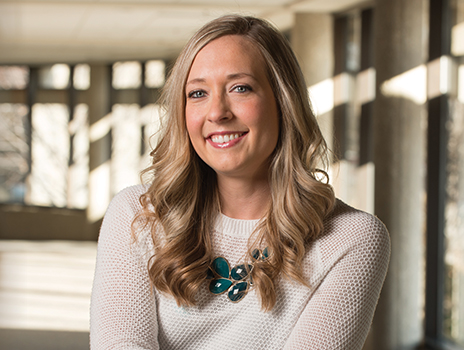- Home
- News Room
- Patient Stories Search Page
- Persistence Pays off for Colorectal Cancer Patient
August 13, 2019
Colorectal cancer is typically diagnosed in adults over age 50. So when a 20-year-old college student showed telltale signs of the deadly disease, her doctors were puzzled.
Ashley Havlena heard a myriad of possible explanations for her recurring rectal bleeding from physicians. Among them: anal fissures, colitis, hemorrhoids and lack of dietary fiber. Even as a nursing student, Ashley knew her chronic symptoms likely indicated something more serious.
Determined to find answers, she persisted, all while completing nursing school at the University of Nebraska, Lincoln, and securing a position as a pediatric intensive care nurse at Children’s Mercy Hospital in Kansas City, Missouri. Finally, after 3 years and rounds of inconclusive testing by multiple physicians in 2 states, Ashley received the diagnosis she most feared: rectal cancer.
Rare among rectal cancer patients
At age 24, Ashley was an exception among colorectal cancer patients. More than 90% of colorectal cancer cases are diagnosed in people age 50 and older, though incidence is increasing in people 40 and under.
“I had so many questions and I wanted immediate answers for what I needed to do to remove this growing tumor,” says Ashley, whose cancer was classified as stage 3.
Ashley began treatment at The University of Kansas Cancer Center in Overland Park in October 2011. There, she met with a radiation oncologist, and Stuart Hinton, MD, medical oncologist. Together, they formed a plan of attack against a golf ball-sized tumor located in her colon near the rectum.
Because chemotherapy and radiation can cause infertility, Ashley was particularly concerned with preserving her fertility. A gynecologic oncologist laparoscopically detached Ashley’s ovaries from the fallopian tubes and reattached them to her abdominal oblique muscles. Relocating the ovaries shields them from radiation and also allows them to remain viable so that Ashley could attempt pregnancy using in vitro fertilization in the future. During this procedure, the gynecologic oncologist also removed a benign tumor from Ashley’s left ovary.
Fight of her life
Ashley began simultaneous chemotherapy and radiation on October 31. After completing the initial round of treatments, her tumor was dramatically reduced to the size of a pencil eraser. Surgeons removed the tumor during a colon resection in January 2012, when she also received a temporary ileostomy to remove body waste.
After recovering from surgery, Ashley endured 6 more months of chemotherapy every other week. During treatment, she recalls patients would look at her quizzically because she was always the youngest person in the infusion room.
“The nurses, nurse practitioners and doctors are wonderful – they become a second family,” Ashley says. “You’re in this turmoil of a cancer diagnosis, and then you see familiar faces and they remember you, and that puts a smile on your face. It makes treatment less intimidating and scary.”
Ashley’s medical oncologist, Dr. Hinton, says Ashley fought a difficult diagnosis with poise and resolve.
“Ashley confronted many challenges throughout her diagnosis and treatment, but with the support of her family and friends she faced them all with grace and strength,” says Dr. Hinton. “I have the utmost respect for not only what she went through, but how she went through it.”
Spreading awareness
An avid Huskers fan, Ashley managed to be on the sidelines cheering on her team even in the midst of cancer treatment. She displays that same perseverance today, at 27, as she works to complete her master’s degree at the University of Kansas School of Nursing with plans to pursue her doctorate. She’s also preparing to be married in June to Shawn Flynn, who has been by her side since her cancer diagnosis.
“I’ve always been healthy and have absolutely no family history, but colon cancer can affect anyone,” says Ashley. “I believe if I’d had a colonoscopy the first time I spotted blood, it would have been a polyp and easily removed before it became cancerous.
“My experience shows how important it is to be an advocate for your health. If anyone with symptoms comes up to me now, I tell them to get a colonoscopy. Colon cancer is the only preventable cancer. I love spreading awareness. It’s what keeps me going.”
